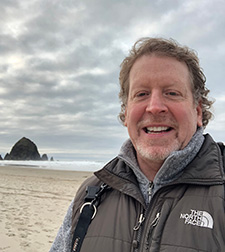For the better part of the last 30 years, Michael Skehan ’86 was a successful healthcare administrator, holding titles like chief operating officer; executive director, clinical services; vice president of clinical and support services; and chief administrative officer in places like Denver, San Francisco, Phoenix, and Portland, Oregon.
Along the way, he earned the reputation as a fixer, someone who turns around struggling hospitals or helps them move from good to great. Those situations can be more stressful with fewer resources and a shorter runway to make things happen.
The stress caught up with him in the form of high blood pressure, cholesterol, and difficulty sleeping. That’s when he started thinking more holistically about his health, realizing that his mental and physical health were more important than a job title.
He made the decision to leave healthcare. Now, working from his home in Cannon Beach, Oregon, Skehan is the guest response specialist for the Escape Lodging Company, which owns and operates hotels, branded hospitality projects, and restaurants.
We asked the political science major about the transition from an established career into a new one.
How did you get into health care?
MS: I just kind of fell into it. I was working for an organization in Indianapolis as a recruiter, and the kinds of roles I filled were healthcare related. In 1990, I applied for a role at St. Joseph’s Medical Center in South Bend, Indiana, and was fortunate enough to get it. I started my career in hospitals and human resources, and then fairly quickly moved into hospital operations. And that opened up a lot of different doors.
When you think about what got you to today, was there an event where you felt like, ‘Oh, something has to change,’ or was it something gradual over time?
MS: Healthcare leadership is tough. You’re asked to do a lot, and sometimes, you don’t necessarily have all the resources that you want. As a part of that, I have a reputation of helping organizations that need some really hard work done. Those turnaround situations are hard. You’re doing the work, maybe in three years, that you typically would do in six or seven years, very intensive, a lot of hours.
How hard was it to walk away? What were the counterbalances as you worked through that?
MS: The biggest concern I had was can I let it go? I feel like I’m giving up what I've invested in my whole career. It wasn’t an overnight decision, but, it certainly happened sooner than what my spouse and I had anticipated.
For my own mental and physical health, we made that decision. That’s when I shared the decision with my employer. During that six-month period, as they were starting to look for a replacement, I got more comfortable with the idea of the transition. I had really been thinking about this for well over a year, and that made it easier.
What did you do to refocus yourself in a way to get healthier?
MS: I sought out a counselor. I found this wonderful therapist who from our first session helped me deal with things differently. I went in saying they are all wrong; they are the problem. She very clearly said, “Michael, you are both the challenge and the solution. You hold that within your own realm to help yourself.” It was so beneficial for me to see that I needed to turn my energy inward.
What made you jump at this current opportunity?
MS: Actually, I had applied for a few of different roles, all of which were in the hospitality, because in Cannon Beach, that’s our main industry. I always envisioned my dream job being one where I could walk to work, come home for lunch, let the dogs out, that kind of thing. I wasn't envisioning at the time that I would find something where I could work from home. When I applied and found out that’s really what this role could involve, wow, that was an unexpected benefit.
When you think back to your time in healthcare, how does that experience help you now?
MS: Skills like how to run a meeting, how to prioritize, how to multitask, and how to work through difficult discussions come to mind. Communication, whether it's verbal or online, is what I’m doing now. Those experiences definitely helped me be a better communicator.
What are the rewards of putting yourself or your health first? What are the challenges?
MS: I’m sleeping better. I feel better physically. I’m less anxious—which is one of the key ways that this played out for me. It’s no longer about getting through the day. It’s all about loving today. It's really about enjoying and making the most out of the life that I've got.
You have to be a little gutsy to make this move. We found a way to make this happen. I’m thankful that it has worked out, but it took a little courage on my part, and a little bit of faith, that I could do something different and still feel good about it.
We never could have done this, and we wouldn't have done it, had there not been a semblance of financial security behind us. I'm thankful that over the years I was able to put money away for both retirement and savings.
For many, money is a worry and a stressor. I am very fortunate to be in a position to have this opportunity. I am learning to enjoy life, the life I really want to live.